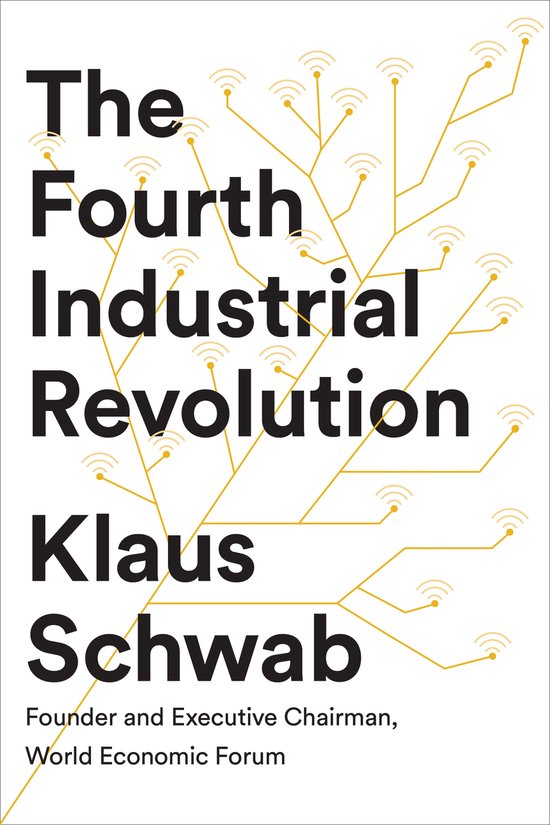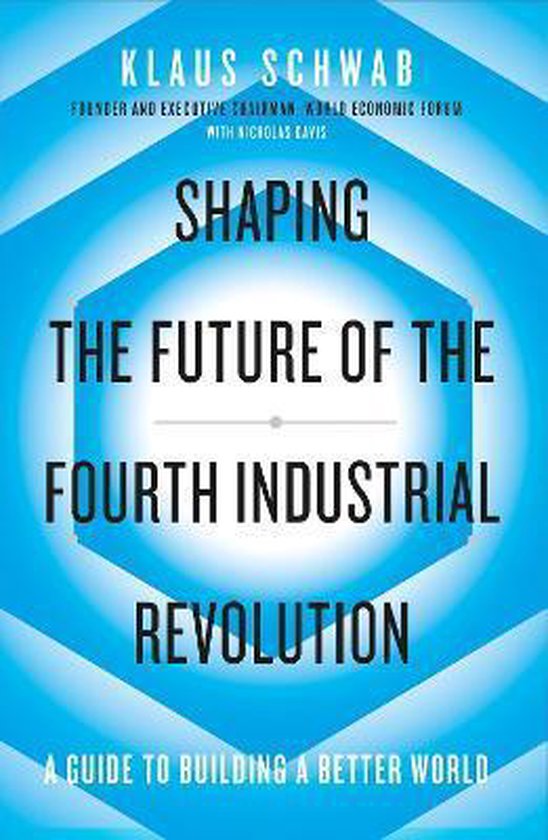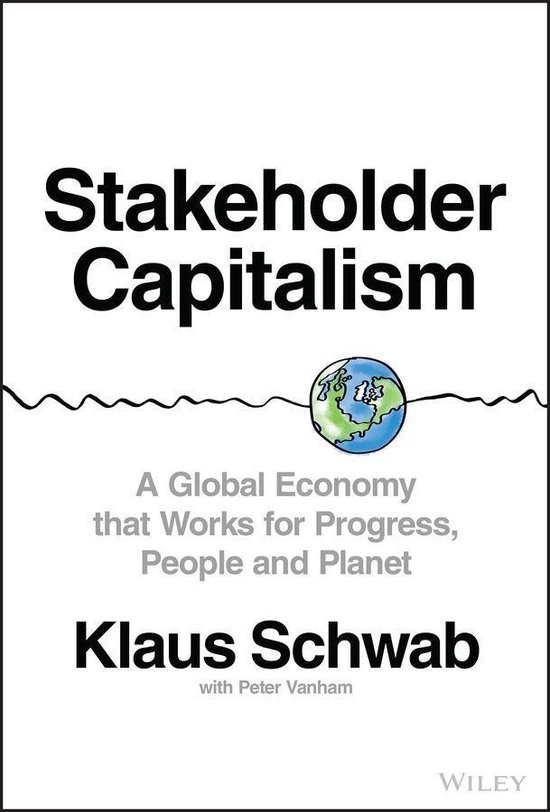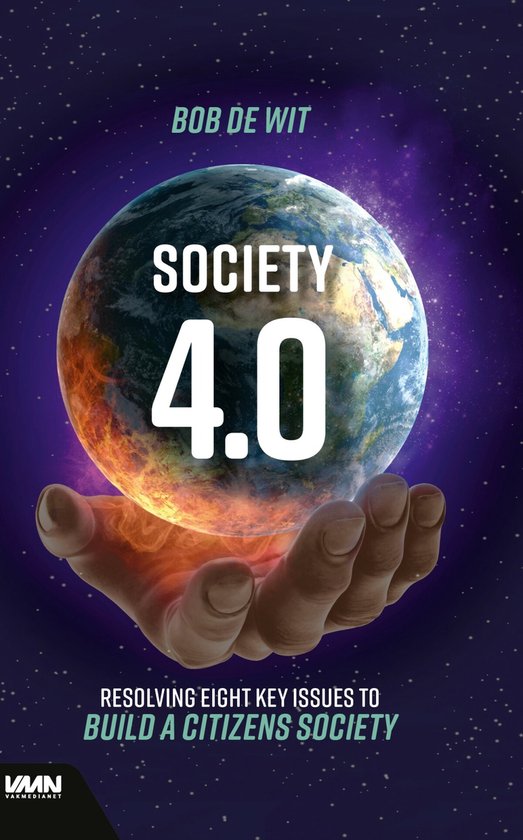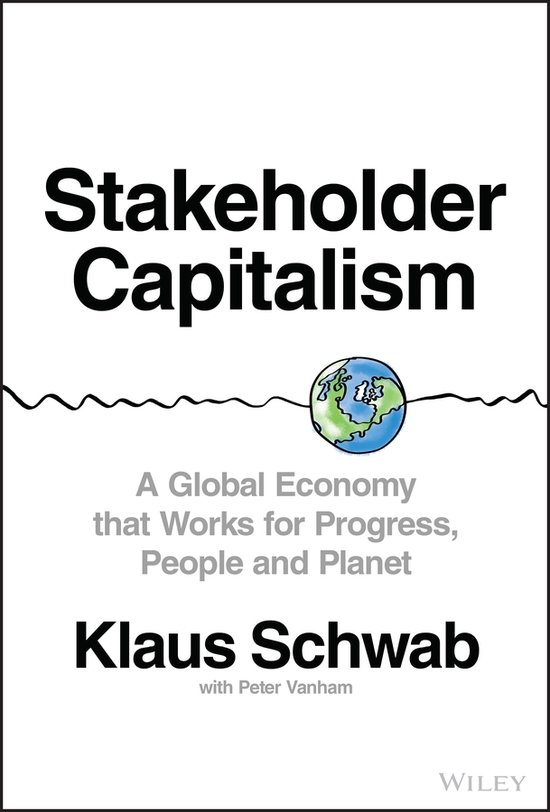
Stakeholder Capitalism
Praise for Stakeholder Capitalism
"Stakeholder Capitalism offers a vision for politics and economics driven not only by value creation, but by values. Professor Schwab's timely book gives us hope for a future in which an 'inclusive and virtuous economic system,' shaped by ideals like truth, trust, and service, might bind us together as one species caring for one another and for our planet."
—Yo-Yo Ma, Cellist
"Klaus Schwab has encouraged his readers for decades to keep their eyes on the future because when we set our gaze on the horizon, our minds can better plan for the obstacles and opportunities before us. In Stakeholder Capitalism, Professor Schwab invites us also to look side-to-side, to the many constituencies in the public and private sectors that through partnership and collaboration can make the future brighter, more inclusive and more sustainable."
—Satya Nadella, CEO, Microsoft
"Both readable and fascinating, Stakeholder Capitalism aptly explains why the twin curses of climate change and biodiversity collapse are so prevalent today, and what's stopping us from achieving a more sustainable and equitable global economy. Through his focus on values, Klaus Schwab acknowledges that head (intellect, rationality) and heart (love, respect, understanding) need to work in harmony for the well-being of future generations and our home, planet Earth."
—Jane Goodall, Founder, the Jane Goodall Institute; United Nations Messenger of Peace
"In the 1970s, Milton Friedman famously defined 'shareholder capitalism,' and companies were urged to orient themselves towards a single goal: returns for shareholders. Over the course of the last decades we have all seen that the complexities of the challenges we face require that businesses take a broader approach, trying to achieve a balance among several goals. This is not easy. That is why Klaus Schwab's new book is an essential guide. It explains the depth of the challenges we face and outlines a path forward that businesses must take if they are to thrive in the 21st Century."
—Fareed Zakaria, Host of CNN's Fareed Zakaria GPS
"For decades, Klaus Schwab has helped to shape the debate on the global economy, and the role of business. Now, as we emerge from the COVID crisis, this incisive and timely book analyzes the myriad of challenges we face, and proposes a way forward powered by the power of innovation, fair competition and responsible business. All is not lost, but an urgent reset of capitalism is required. Stakeholder Capitalism is a call to action—and action is needed, now."
—Ana Botín,, Group Executive Chairman, Banco Santander
"Fifty years ago Klaus Schwab first proposed his theory that businesses are not only responsible to their shareholders, but also to all their stakeholders. With a global economic system generating deep divisions and inequalities, Klaus renews his call for a form of capitalism that works for everyone and where businesses don’t just take from society but truly give back and have a positive impact. Stakeholder Capitalism is an urgent call to action."
—Marc Benioff, Chair and CEO, Salesforce
"If you think this is just another pre-COVID/post-COVID book, think again. Klaus Schwab draws on his vast experience to take us on a roller-coaster ride past the highs and lows of post-war capitalism. His knack for economic storytelling gives you a real and deep insight into where we are headed and what we should be aiming for."
—Alexander De Croo, Prime Minister of Belgium
"We can no longer think short term. Companies need to answer to more than their shareholders; they need to be accountable to higher morals. Now, in the middle of the COVID-19 crisis, Klaus Schwab shows us that we cannot go back to business as usual. He inspires us to look at the current response of global solidarity between people, companies, and governments to this health crisis and see it as the unequivocal way to a new paradigm to tackle the climate crisis and the scandal of rising inequality in the world."
—Angélique Kidjo, Musician and UNICEF Goodwill Ambassador
"For a half-century, Klaus Schwab has been consistent in his belief that public companies can drive great returns for their shareholders AND address society's most important priorities. The world now understands that the system he envisioned—what we call Stakeholder Capitalism—can align capital to those outcomes better than any other."
—Brian Moynihan, CEO, Bank of America
"Stakeholder Capitalism offers a timely analysis that shows how the neoliberal economic system privileges billionaires and extractive corporations over the dignity of billions of people and the protection of our planet. As COVID-19 has deepened despair and economic, gender and racial inequalities, governments must—with stakeholders—act decisively to depart from shareholder-first capitalism and instead put human rights at the heart of our economy."
—Gabriela Bucher, Executive Director, Oxfam International
"Professor Schwab's new book offers us insightful perspectives on the world's economic history and the thinking that has led us towards the greatest challenges we face today – none larger than climate change. More importantly, it offers a blueprint for the future, inviting us to build a more inclusive, prosperous, healthier and greener world by embracing Stakeholder Capitalism at scale."
—N. Chandrasekaran, Executive Chairman, Tata Sons
"In Stakeholder Capitalism my good friend Professor Schwab outlines an inspiring way forward in making the global economy more equitable, sustainable and future-proof. A vision that fits in perfectly with all his efforts over the years to build a better world. Once again, Professor Schwab gives us food for thought and reflection with this fascinating book."
—Mark Rutte, Prime Minister of the Netherlands
Reimagining our global economy so it becomes more sustainable and prosperous for all
Our global economic system is broken. But we can replace the current picture of global upheaval, unsustainability, and uncertainty with one of an economy that works for all people, and the planet. First, we must eliminate rising income inequality within societies where productivity and wage growth has slowed. Second, we must reduce the dampening effect of monopoly market power wielded by large corporations on innovation and productivity gains. And finally, the short-sighted exploitation of natural resources that is corroding the environment and affecting the lives of many for the worse must end.
The debate over the causes of the broken economy—laissez-faire government, poorly managed globalization, the rise of technology in favor of the few, or yet another reason—is wide open. Stakeholder Capitalism: A Global Economy that Works for Progress, People and Planet argues convincingly that if we don't start with recognizing the true shape of our problems, our current system will continue to fail us. To help us see our challenges more clearly, Schwab—the Founder and Executive Chairman of the World Economic Forum—looks for the real causes of our system's shortcomings, and for solutions in best practices from around the world in places as diverse as China, Denmark, Ethiopia, Germany, Indonesia, New Zealand, and Singapore. And in doing so, Schwab finds emerging examples of new ways of doing things that provide grounds for hope, including:
- Individual agency: how countries and policies can make a difference against large external forces
- A clearly defined social contract: agreement on shared values and goals allows government, business, and individuals to produce the most optimal outcomes
- Planning for future generations: short-sighted presentism harms our shared future, and that of those yet to be born
- Better measures of economic success: move beyond a myopic focus on GDP to more complete, human-scaled measures of societal flourishing
By accurately describing our real situation, Stakeholder Capitalism is able to pinpoint achievable ways to deal with our problems. Chapter by chapter, Professor Schwab shows us that there are ways for everyone at all levels of society to reshape the broken pieces of the global economy and—country by country, company by company, and citizen by citizen—glue them back together in a way that benefits us all.
| Auteur | | Klaus Schwab |
| Taal | | Engels |
| Type | | Hardcover |
| Categorie | | Wetenschap & Natuur |
